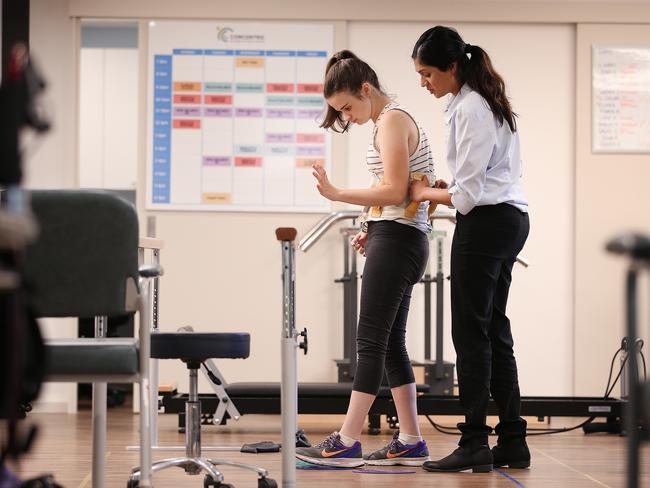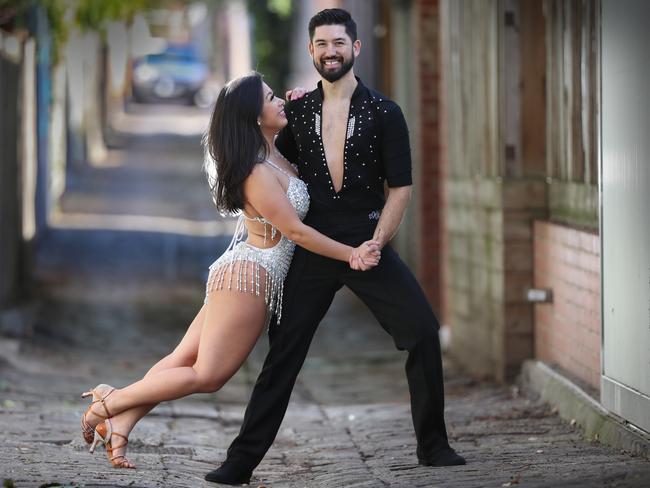Election pitch promises Australian-first youth stroke recovery service
YOUNG stroke survivors would be funnelled into clinical trials for new treatments and recovery interventions, as well as being helped back into the workforce as part of an Australian-first one-stop-shop.
VIC News
Don't miss out on the headlines from VIC News. Followed categories will be added to My News.
YOUNG stroke survivors would be funnelled into clinical trials for new treatments and recovery interventions linked to other young patients, and helped back into the workforce as part of an Australian-first one-stop shop.
The proposal for the world-first Youth Stroke Service, led by the Stroke Foundation and Florey Institute of Neuroscience and Mental Health, has been delivered as an election pitch to reduce the burden of stroke in working-age adults.
One in every four strokes now occur in people under 65, and 1400 Victorians aged 18-55 have a stroke each year. Almost all report having ongoing needs and “hidden disabilities” such as fatigue and cognitive problems.
RELATED: STROKE SURVIVORS STRUGGLE TO RETURN TO WORK
STRATEGIES TO PREVENT STROKE ‘NOT GOOD ENOUGH’
WORLD-FIRST STROKE RESEARCH OFFERS HOPE FOR BRAIN INJURIES

Half of survivors who want to return to work report not being given the support to do so, leading to almost $1 billion in lost earnings.
Florey Professor Julie Bernhardt said the current rehabilitation system was designed for elderly stroke patients who had a different set of physical, psychological and social needs to young survivors hit during peak periods for work, study and raising a family.
“It’s surprising how many young people don’t have rehab, so we want this to work as a referral system so when people finish their hospital stay they can come to us and link them to the services relevant to this population,” Prof Bernhardt said. “The research arm aims to find better ways to help survivors return to work, identify new targets to prevent further strokes and uncover what causes strokes in young people.”
The Florey team, with Austin Hospital’s head of stroke Professor Vincent Thijs, is surveying stroke survivors about their unmet needs to help design the proposed service.
Previous research, led by medical student researcher Jessica Shipley, found that on top of physical changes, young stroke survivors often experienced long-term depression and anxiety, loss of identity and relationships, and were often dismissed by the medical system and society for being “too young” to have a stroke.
Stroke Foundation chief Sharon McGowan said given the number of working-age people affected by stroke was expected to increase, the proposed service would address innovative ways of addressing rehabilitation gaps.
Minister for Health Jill Hennessy and Opposition health spokeswoman Mary Wooldridge both said they were committed to investing in stroke treatment, prevention and recovery.
TO TAKE PART IN THE FLOREY STROKE SURVEY GO TO:
https://bit.ly/2HZSTmZ
ERNESTO PUTS BEST FOOT FORWARD
STROKE survivor Ernesto Diaz has danced his way to a second chance of life.
He was just 24 when he was struck down — one of 20 working-age Australians to have suffered a stroke on that one day in 2006.
“When you’re young, you think you’re Superman,” Mr Diaz said. “But my lifestyle — the smoking and drinking — accelerated the process of the aneurysm.”
Of his recovery, he said: “I had to learn how to write again, how to speak and walk. I could think the words, but I couldn’t say them.”

New research from the Stroke Foundation shows that more than 80 per cent of strokes can be prevented by adopting a healthier lifestyle, reducing blood pressure and cholesterol levels.
Smoking, excessive alcohol consumption and being overweight are linked to increased stroke risk.
Mr Diaz took up salsa dancing as part of his rehabilitation, and is now an instructor, on top of his full-time job in real estate.
“Dancing got me out of the house and thinking about what I could work towards next,” the 35-year-old said.
He is holding a salsa event to raise money for the Stroke Foundation and the Royal Melbourne Hospital’s stroke unit at Melbourne Bowls Club on September 29.


